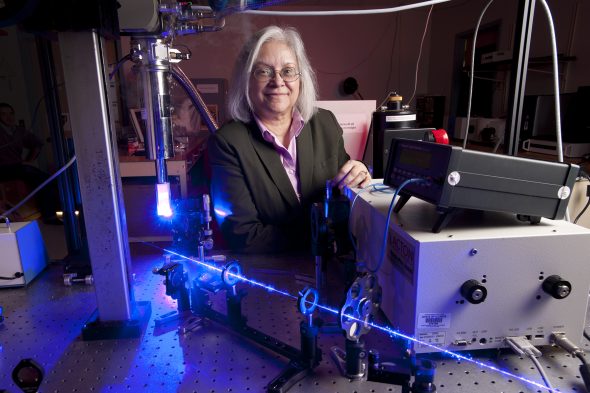Biomedical consortium shares powerful research tools

Chicago Biomedical Consortium funding will expand UIC’s research capabilities, says Mitra Dutta, vice chancellor for research.— Photo: Roberta Dupuis-Devlin
UIC will purchase powerful new tools for research with its share of $3 million from the Chicago Biomedical Consortium that allows the consortium’s three university members to obtain — and share — high-impact, next-generation scientific equipment.
Through the consortium’s Open Access Initiative, researchers at UIC, University of Chicago and Northwestern University can use each other’s core-facility instrumentation at no additional “outsider” cost.
“The CBC funding will help strengthen and expand our research capabilities by allowing us to add to an already robust array of equipment available not only to UIC researchers, but also to our colleagues at Northwestern and University of Chicago through the Open Access Initiative,” said Mitra Dutta, vice chancellor for research.
Each university will receive $1 million to acquire state-of-the-art scientific instrumentation. In return, the university will provide additional resources, including space, staffing and long-term support, for the equipment.
“Chicago leads the nation with this new model for more economically acquiring cutting-edge technology for multiple institutions,” said consortium scientific co-director Shohei Koide, professor of biochemistry and molecular biophysics at the University of Chicago.
UIC will use its funding to acquire Chicago’s first complete single-cell analysis system for gene expression analysis and direct, quantitative measurement of proteins at the single-cell level.
Recent evidence suggests that individual cells of the same type within a population can differ greatly. Since these differences could affect the function of the entire cell population, single-cell analysis is an important biomedical frontier.
Northwestern will acquire a next-generation electron detector for its cryo-electon microscope (cryoEM) core facility. With CryoEM, researchers can visualize unaltered biological samples in their native environment, at scales ranging from cellular to near-atomic resolution. Its many uses include the study of the molecular mechanisms of disease and predicting the behavior of drugs and biological matter. Only about 25 of these cameras are operational in the U.S., none in the Midwest.
The University of Chicago will purchase a cryo-electron microscope that will operate with Northwestern’s facility to expand imaging capabilities, allowing UChicago to build upon its strengths in structural biology and molecular engineering.
The Chicago Biomedical Consortium is supported by the Searle Funds at The Chicago Community Trust.
